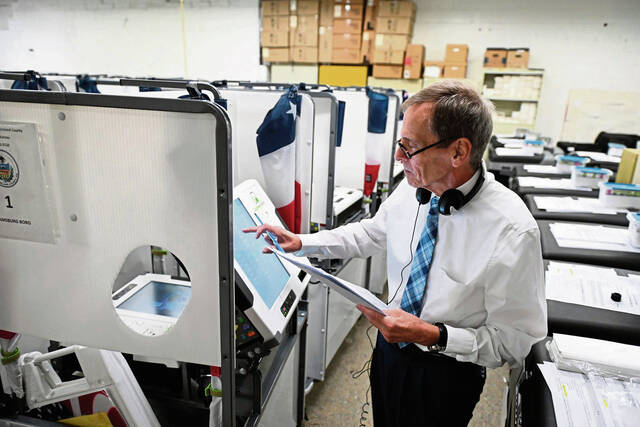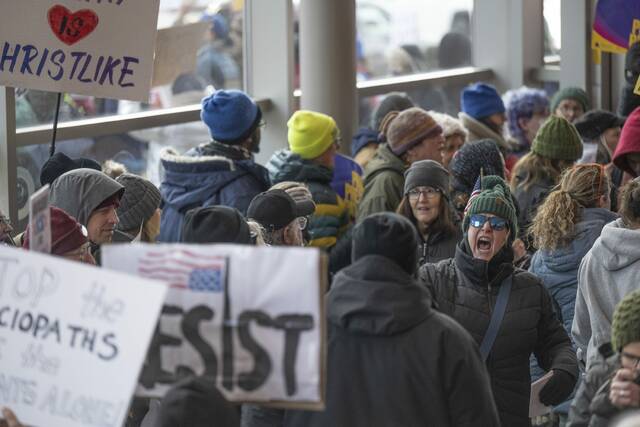A program designed to receive payments from the area’s largest nonprofit entities could raise a “baseline” of $14.5 million per year, according to a report released Tuesday by Pittsburgh City Controller Michael Lamb and Allegheny County Acting Controller Tracy Royston.
As of 2021, almost 10% of all property in Allegheny County and 20% of all property in Pittsburgh was owned by nonprofits with tax-exemptions, the report said.
The five largest exempt institutions in the area — UPMC, Highmark/AHN, the University of Pittsburgh, Carnegie Mellon University and Duquesne University — together account for 47% of non-government exempt property in the county, and 63% in Pittsburgh.
“The Pittsburgh region has been justifiably lauded for its transition from a primarily industrial economy to one in which ‘eds and meds’ comprise a significant and growing share of employment and economic activity,” Royston said. “However, these institutions’ continued emergence as property owners, developers and economic drivers has presented challenges to our local governments.”
If not for their tax-exempt status, the region’s five largest nonprofits would contribute $127.5 million in taxes to local municipalities, school districts and Allegheny County annually, the controllers’ report said. Allegheny County would receive $23.5 million, and Pittsburgh would get $34.5 million per year.
“Now is the time for a substantive conversation aimed toward establishing meaningful and predictable contributions from these entities to our local governments,” the controllers said in a statement.
The report determined that “meaningful, predictable and legally-binding” agreements for payments-in-lieu-of-taxes, or PILOTs, need to be implemented to “ensure equity between large and growing nonprofit institutions and taxpaying home and business owners.”
Pittsburgh City Council in March introduced legislation pushing for PILOT payments to help fund the city’s infrastructure needs. Such payments would account for a portion of what the nonprofits would otherwise pay in taxes.
UPMC President and CEO Leslie Davis has met multiple times with Pittsburgh Mayor Ed Gainey, said Paul Wood, vice president and chief communications officer for UPMC.
“The city of Pittsburgh has known for many years that it has UPMC’s support and can count on our fullest possible participation in programs that are fair and equitable and include the region’s other major nonprofits,” Wood said.
Highmark Health officials also meet regularly with county and city leaders, said spokesperson Candace Herrington.
“We are fully committed to meeting our obligations, and in fact, Highmark Health overall, including AHN, paid more than $300 million in taxes in 2021,” Herrington said. “Highmark Health and AHN, however, also have a long history of going above and beyond tax obligations to benefit and strengthen the communities we serve.”
She highlighted the nearly $1.4 billion Highmark Health invested in the last two years “to help our communities navigate and respond to the covid-19 pandemic.”
Other nonprofit entities contacted by the Tribune-Review on the matter have largely declined to comment.
“The burden of the city of Pittsburgh’s government falls too heavily on city residents,” Lamb said, adding that hospitals and universities benefit the city, but also rely heavily on city services. “They must come to the table and contribute to the operation of local governments where they operate, starting with the city of Pittsburgh.“
Current PILOT arrangements provide little funding for local governments, the controllers said in their report. In 2020, Pittsburgh raised only $325,309 from PILOTs, while Allegheny County raised $569,499.
The most recent attempt to recoup money that would otherwise be paid in taxes was the nonprofit OnePGH, which sourced support from nonprofit and for-profit entities.
Still, the region’s major nonprofits didn’t make substantial enough contributions, and their commitment to the fund can’t be enforced, the controllers’ report said.
UPMC contributed $40 million to OnePGH, according to Wood.
“UPMC has always been a significant contributor to the city of Pittsburgh in a myriad of ways and will continue to be so,” he said.
If Allegheny County and the city of Pittsburgh secured PILOT agreements with just the five largest nonprofits in the area that amounted to 25% of what they would otherwise pay in taxes, it would generate $5.9 million for the county and $8.6 million for the city each year, the report estimated.
The controllers said that 25% contribution should be considered a “baseline” payment, rather than a maximum amount of contributions that could be possible.
In Erie, local governments have agreements in place for payments of 50% of exempt property tax value with 11 institutions, including UPMC and AHN.
Both health care giants reported net income of over $1 billion in 2020, while Pitt and Carnegie Mellon ended fiscal year 2019 with more than $200 million in net income, in addition to combined endowment assets totaling more than $7 billion, the controllers said.
The report also noted that outside analyses have detailed UPMC’s “fair share deficit” and advised that greater scrutiny of the organization’s tax-exempt status may be warranted.
“Some of our region’s largest institutions may not meet the definition of a charity required for exemptions at all, but they have never had this status challenged or scrutinized by the courts,” Royston said. “Regardless of the mechanism used, institutions with millions or even billions in annual revenue must begin paying their fair share.”








